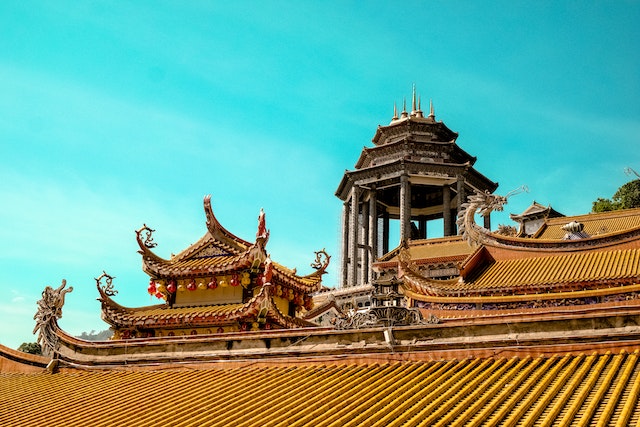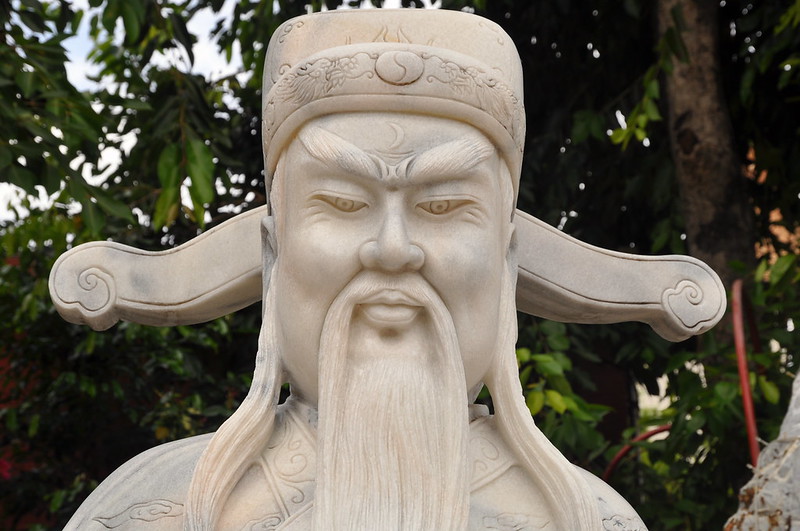
Chinese mythology is a rich and diverse collection of stories and characters that have been passed down through generations.
It includes gods, goddesses, demigods, legendary heroes, magical creatures, mythical beasts, and other enchanting beings.
There are hundreds of gods in Chinese mythology who represent different aspects of life, such as war, love, strength, and luck.
These gods are believed to have powerful abilities, enabling them to bring good fortune and blessings to those who honor them.
In this article, we will explore some of the most popular gods in Chinese mythology and their stories.
Nu Wa – Creator God
Nu Wa is a creator god in Chinese mythology who is said to have created the world and all the creatures that inhabit it.
She was born of the great goddess Nügua, who gave her splendid gifts like an inexhaustible cauldron, a magical hammer, and five-colored stones with which she fashioned mountains and rivers.
Nu Wa is also credited with creating mankind and teaching them the arts of civilization.
She was a powerful figure whose creativity and intelligence were admired by all in ancient China.
In some stories, she is even said to have helped the gods battle against the forces of chaos.
Nu Wa remains one of the most popular gods in Chinese mythology today and is celebrated as a symbol of creative power and wise leadership.
- Read also: 10 Fascinating Ancient History Facts
- Read also: 10 Fascinating Egyptian Mythology Facts
Fu Xi – God of Writing and Civilization

Fu Xi was one of the earliest gods in Chinese mythology, credited with many inventions and discoveries – including the origin of writing.
He is said to have developed a system for communicating by symbols that eventually became the Chinese writing system. He also taught his people how to hunt, fish and weave.
Fu Xi was worshipped as a god of culture, knowledge and civilization, believed to have bestowed gifts of wisdom upon the people.
He is often depicted as a wise man with a long beard, dressed in fine robes and crowned with a tall hat that symbolizes his great wisdom and intellect.
Guan Yu- God of War and Loyalty
Guan Yu is one of the most beloved gods in Chinese mythology, recognized as a symbol of loyalty and righteousness.
He was originally a real-life general during the late Han Dynasty who became deified after his death.
Guan Yu is typically portrayed holding a large guan dao (halberd) and wearing a red face mask.
He is venerated as the patron saint of martial artists, bodyguards, soldiers, police officers, and businessmen.
It is said that he protects those who are loyal to him with his incredible strength in battle. He is also revered as a god of justice, mercy and honor.
Guan Yu is a powerful figure in Chinese mythology who is still honored today for his courage, loyalty and sense of justice.
Hou Yi – God of Archery
Hou Yi was a legendary archer who rose to fame after he shot down nine suns that were blazing across the sky and threatening to scorch the earth.
As a reward for his heroic deed, he was given an elixir of immortality by the Queen Mother of the West.
He later used this elixir to save his wife from death.
Hou Yi is widely celebrated as a god of archery and accuracy, believed to bring luck and good fortune to those who honor him.
He is often depicted with a bow and arrow in hand, ready to take aim at any target.
He is also associated with loyalty, courage, and justice – traits that were embodied by the legendary archer.
Hou Yi remains one of the most popular gods in Chinese mythology today, revered for his bravery and skill with a bow and arrow.
Lei Gong – God of Thunder
Lei Gong is the god of thunder in Chinese mythology, known for his fearsome temper and for wreaking havoc on those who disobey him.
He is usually depicted as a muscular man with bulging eyes and a thunderous expression, wearing metal armor and carrying two blunt hammers.
Lei Gong is believed to unleash his wrath upon unruly mortals by throwing lightning bolts from the heavens or sending terrifying storms to earth.
He is associated with justice and retribution, punishing those who have done wrong but rewarding those who follow the laws of nature.
Although he is a terrifying figure, Lei Gong is also seen as a protector of the people and respected for his power. He remains one of the most popular gods in Chinese mythology today.
Shennong- God of Agriculture and Medicine
Shennong is an important god in Chinese mythology, credited with teaching people how to cultivate crops and use herbs for healing.
He is usually portrayed as an older man with a long beard wearing farmer’s clothes, and carrying a bag full of medical tools and farming implements.
According to legend, Shennong used his divine powers to travel the land in search of knowledge, sampling various herbs and plants to determine their medicinal properties.
He is also believed to have invented tools such as the plow and axe that were used for farming.
Shennong remains an important figure in Chinese mythology today, worshipped as a god of agriculture and medicine.
- Read also: 10 Japanese Mythology Facts That Are Fascinating Mystery and Legends
- Read also: 10 Greek Mythology Facts That Most People Don’t Know
Nezha – God of Protection and Strength
Nezha is a popular god in Chinese mythology, renowned for his strength, courage, and protection.
He is typically depicted as a young boy with a red face mask who wields three magical weapons: a dragon-headed fire wheel, a wind-fire wheel, and a magical lotus flower.
According to legend, Nezha was born with supernatural powers that he used to protect his people from harm and defeat evil monsters.
He is worshipped as the god of protection and strength, believed to bring luck and good fortune to those who venerate him.
Nezha is a beloved figure in Chinese mythology, respected for his heroic deeds and for standing up to tyranny and injustice.
Overall, Chinese mythology is full of gods and goddesses who embody various traits such as bravery, loyalty, justice, and strength.
These gods are often depicted in art and literature to remind us of their power and protect us from evil forces.
They remain popular figures in Chinese culture today and continue to be revered for their courage and wisdom.



